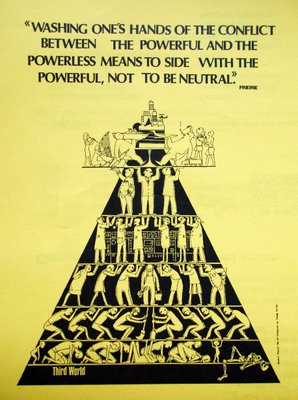 我们的社会是椭圆形的,还是三角形?
我们的社会是椭圆形的,还是三角形?Some people say the structure of our society is an Oval(with middle-class), but I am tend to know more about the triangle now... ...
自李唐来,世人盛爱牡丹;予独爱莲之出淤泥而不染,濯清涟而不妖,中通外直,不蔓不枝,香远益清,亭亭静植,只可远观而不可亵玩焉。-周墩颐 Most people like peony since Tang's.But I like Lotus.It grows in the muddy pond but always clean.It is pure,delicate and bright. The stem shows its consistency, continuity and coherent deep inside.It looks decent and honest.Its pleasing fragrance could spread far away.It has no redundant branches.You ought to enjoy its beauty from far but it can never be tainted.(By Zhou Dun Yi)
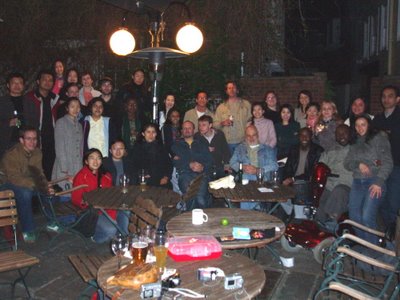
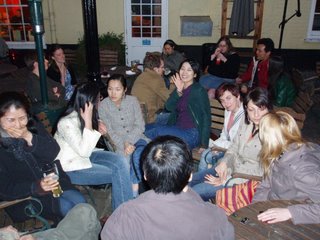

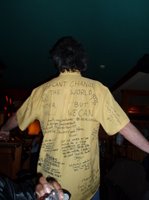

考试前一个星期,日夜“开车”紧凑复习,考试后,竟然有种空虚怅惘的感觉。与几位同学闲聊时,大家都对于即将从批判性极强的课堂理论,回到可能渐渐吞噬我们 的社会感到无可奈何。我想,老师被学校的僵化制度逼走的无奈,应该是有过之而无不极。平日上课、讨论会上、写作时,同学们极尽可能批判资本主义、新自由主义、世界 银行、国际货币基金组织、联合国、全球化等等,离开象牙塔后,我们在这个充斥非正义、非公正的世界,将选择驻守在怎样的岗位呢?若真被马克思这位已故老人家不幸言中,眼前的一切,是一个过程,我们能在这个过程中做些什么?坚守什么?
我在大伙赠送给老师的黄色衬衫写下:“我来这里寻找答案,您却教我怎么提问,谢谢您的教诲!过程比结果还重要。”
最后,对于那些即将开始人生另一段旅程的同学,同窗的日子将成为美好的回忆,祝福大家。
Finally, the spring course came to the end after our final exam. Last night, we all went out for “pub crawl” again with students in the
The one-week intensive exam preparation was followed by a sense of emptiness and void after the 3 hours exam. When few of us talked about future, we all have a feeling of impotent towards the society that we are going to face and maybe absorbed gradually by it. I believe that within the rigid teaching appraisal system, our professor, Ken, who enjoys teaching so much, but is forced to leave in the end must be very frustrated, much more than we are.
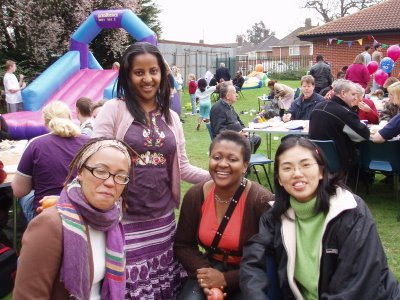 我孤陋寡闻,复活节让我大开眼界。
我孤陋寡闻,复活节让我大开眼界。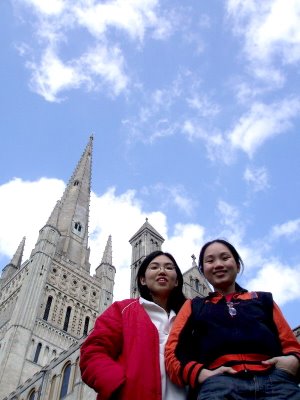





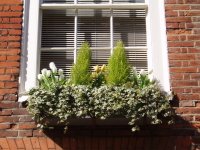
 师妹工作两年后环游世界,路经陋屋,驻留二日,不亦乐乎。她带我尝了Norwich马来西亚餐馆的自助餐及JBWhetherspoon的Fish n Chips。
师妹工作两年后环游世界,路经陋屋,驻留二日,不亦乐乎。她带我尝了Norwich马来西亚餐馆的自助餐及JBWhetherspoon的Fish n Chips。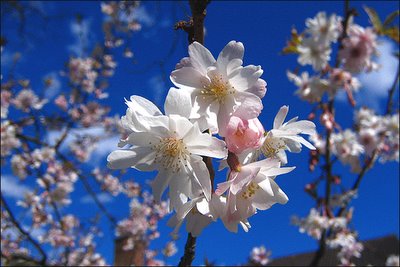 天啊...大师兄沈平镜头下的伦敦花季真是美到叫人心动!!So beautiful.... Blossom in London, pictures are taken by my favourite ex-uni-senior ShumPing.
天啊...大师兄沈平镜头下的伦敦花季真是美到叫人心动!!So beautiful.... Blossom in London, pictures are taken by my favourite ex-uni-senior ShumPing.
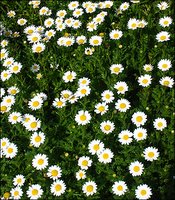
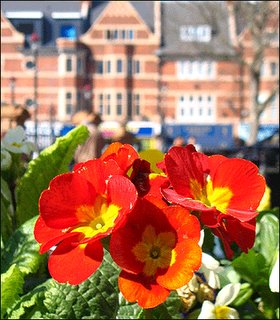
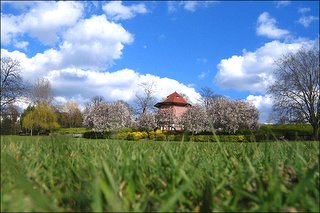
 交还本学期所有作文, 心血来潮,向朋友借了炸油锅和秤,跟着妈妈给的食谱做起咖喱角!妈妈要掉眼镜了,平时我在家里连她的面粉放在哪里都不知道,这回竟自己动手做这样高难度的食物!
交还本学期所有作文, 心血来潮,向朋友借了炸油锅和秤,跟着妈妈给的食谱做起咖喱角!妈妈要掉眼镜了,平时我在家里连她的面粉放在哪里都不知道,这回竟自己动手做这样高难度的食物! I tried to make my favourite malay food -- currypuff. Really hard to imagine that I made currypuffs myself. I don't even know how to use my mum's kitchen scale and flour at home!
I tried to make my favourite malay food -- currypuff. Really hard to imagine that I made currypuffs myself. I don't even know how to use my mum's kitchen scale and flour at home! 系里有一个与墨西哥ZAPATISTA原住民相处了十年的研究生。他常受邀分享有关ZAPATISTA革命运动的故事。有一次与他聊天时,他ZAPATISTA不要资本主义,也不要社会主义,也不是共产主义,我问:那他们要什么?他说:“如果椅子代表权力,政治人物就是常常拿起椅子要打人的家伙,公民社会团体则要求坐在椅子上对话,而ZAPATISTA要做的是把椅子分解、拆开。”
系里有一个与墨西哥ZAPATISTA原住民相处了十年的研究生。他常受邀分享有关ZAPATISTA革命运动的故事。有一次与他聊天时,他ZAPATISTA不要资本主义,也不要社会主义,也不是共产主义,我问:那他们要什么?他说:“如果椅子代表权力,政治人物就是常常拿起椅子要打人的家伙,公民社会团体则要求坐在椅子上对话,而ZAPATISTA要做的是把椅子分解、拆开。”
A Mexican research student told me a lot about Zapatista Movement.He is always invited to give talks about this movement in the school. One thing he said impressed me : assuming that chairs are power, the politicians will use it to beat people, the civil society will try to sit on the chairs to discuss, but Zapatistas will cut the chairs into pieces.
These indigenous people believe that humans, songs, stones, and trees etc are all subjects. Intersubjective communication requires all subjects to "speak, listen, understand and respect each other."It is really attractive and romantic to some extent.Sometimes, I think we really need to learn how to live in harmony with Mother Nature from indigeous people who never talk about "pollution","finite resource"...etc.
When the oppressors use violence to oppress, the voiceless oppressed have no other choice but to resist and protect themselves with weapons.
However, Zapatista movement is pacific and non-violent. Although there was an armed uprising in 1994 to oppose social, political and historical injustice, they adopted unarmed and peaceful approach to promote their ideology.They are anti-capitalism, anti-neoliberalism, anti-globalization, etc. The Zapatista ideology of autonomy is unique.They see autonomy of the indigenous population as a solution to poverty ; they promote a kind of state within a state where peoples can keep their ways of government and communal way of life.
"The natural wealth that leaves these lands doesn't travel over just these three roads (leading to

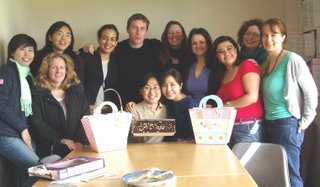
 在日本同学AKI的号召下,四个星期前的星期日,我在诺理奇市中心的其中一家慈善中心OXFAM当起义工。店里摆卖许多二手用品及FAIR TRADE 食品,收入所得将捐助发展中国家的各项援助活动。我的工作很简单,但刚开始使用收银机时频频出错。还有,那些洋人看到两个黑头发的亚洲人在店里当义工时,也投以奇怪(但友善)的眼光。人们可以将完好的、不需要的物品如:衣服、玩具、书本、录影带捐给这类慈善中心去出售,消费者也能以非常低廉的价格购买到必需品。我的冬装及一些用品都是在慈善中心里购买的,我想,等我毕业时,还可以捐回给他们继续摆卖吧?我在去年九月出国前,曾听说JOHORJAYA有一家SALVATION ARMY, 做的应该就是这类生意。对环境管理而言,这可能是鼓励“再使用”的好办法,但环境对于消费品的承载能力究竟有多强?
在日本同学AKI的号召下,四个星期前的星期日,我在诺理奇市中心的其中一家慈善中心OXFAM当起义工。店里摆卖许多二手用品及FAIR TRADE 食品,收入所得将捐助发展中国家的各项援助活动。我的工作很简单,但刚开始使用收银机时频频出错。还有,那些洋人看到两个黑头发的亚洲人在店里当义工时,也投以奇怪(但友善)的眼光。人们可以将完好的、不需要的物品如:衣服、玩具、书本、录影带捐给这类慈善中心去出售,消费者也能以非常低廉的价格购买到必需品。我的冬装及一些用品都是在慈善中心里购买的,我想,等我毕业时,还可以捐回给他们继续摆卖吧?我在去年九月出国前,曾听说JOHORJAYA有一家SALVATION ARMY, 做的应该就是这类生意。对环境管理而言,这可能是鼓励“再使用”的好办法,但环境对于消费品的承载能力究竟有多强?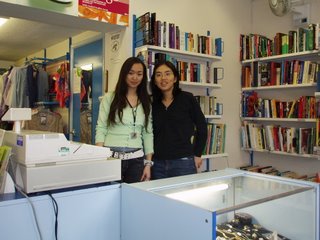 these come from donations, many of them look like newly bought) and Fair Trade products can be found in the shop with very low prices. The income will go to developing countries. Charity shops like Oxfam can hardly be seen in both Malaysia and Japan. Only just before I left Malaysia, I heard about the opening of Salvation Army near the place I lived. In terms of "re-use" in the aspect of environment management, I think it is a good way to manage the things that people do not need them anymore while others who need them can buy with lower prices(I bought many things in charity shops too), it also brings "double dividend" by helping developing countries at the same time , but how big is the capacity for the used things in the environment?
these come from donations, many of them look like newly bought) and Fair Trade products can be found in the shop with very low prices. The income will go to developing countries. Charity shops like Oxfam can hardly be seen in both Malaysia and Japan. Only just before I left Malaysia, I heard about the opening of Salvation Army near the place I lived. In terms of "re-use" in the aspect of environment management, I think it is a good way to manage the things that people do not need them anymore while others who need them can buy with lower prices(I bought many things in charity shops too), it also brings "double dividend" by helping developing countries at the same time , but how big is the capacity for the used things in the environment?